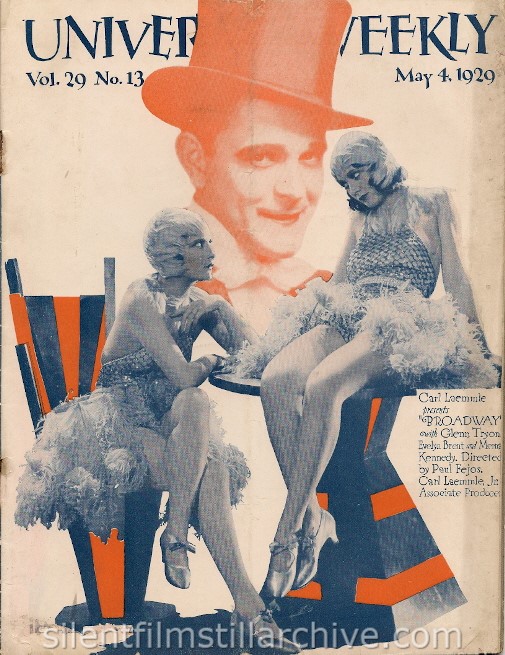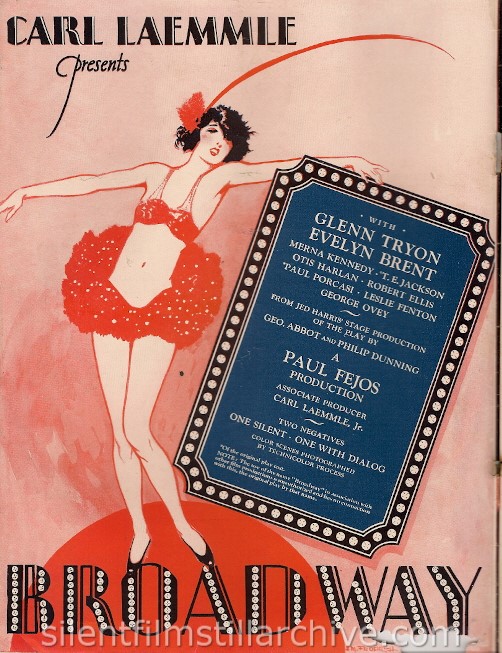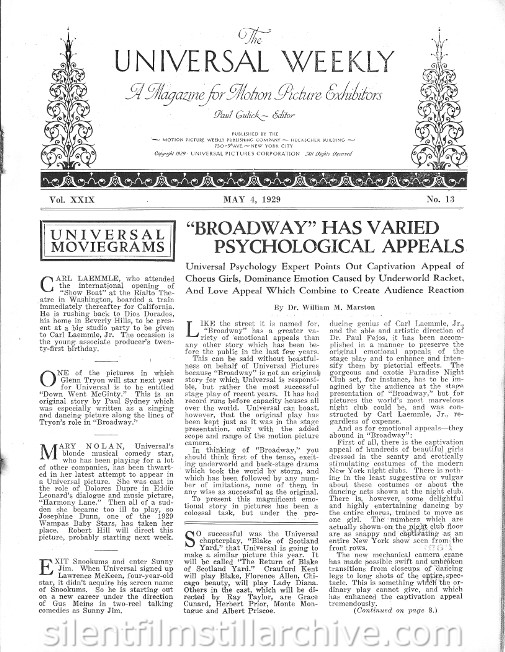![]()

Broadway (1929)

Universal Weeky
Vol 29 No. 13
May 4, 1929
Carl Laemmle presents
"BROADWAY"
with
Glenn Tryon, Evelyn Brent and Merna Kennedy.
Directed by Paul Fejos.
Carl Laemmle, Jr. Associate Producer

CARL LAEMMLE
presents
BROADWAY
with
GLENN TRYON EVELYN BRENT
MERNA KENNEDY *T. E. JACKSON
OTIS HARLAN
ROBERT ELLIS
*PAUL PORCASE LESLIE FENTON
GEORGE
OVEY
FROM JED HARRIS' STAGE PRODUCTION OF THE PLAY BY
GEO.
ABBOT AND PHILLIP DUNNING
A PAUL FEJOS PRODUCTION
ASSOCIATE PRODUCER CARL
LAEMMLE, Jr.
TWO NEGATIVES
ONE SILENT
ONE WITH DIALOG
COLOR SCENES PHOTOGRAPHED BY TECHNICOLOR PROCESS
*Of the original play cast
NOTE: The use of the name "Broadway"
in association with other film productions is unauthorized and has no connection
with this, the original play by that name.
A. M. Froehlich

THE UNIVERSAL WEEKLY
A Magazine for
Motion Picture Exhibitors
Paul Gulick -- Editor
Published by the -- Motion Picture Weekly Publishing Company
-- Heckscher Building --
730 -- 5th Ave. -- New York City
Copyright
1929 UNIVERSAL PICTURES CORPORATION All Rights
Reserved
"BROADWAY" HAS VARIED PSYCHOLOGICAL APPEALS
Universal Psychology Expert Points Out Captivation Appeal of Chorus Girls,
Dominance Emotions Caused by Underworld Racket, And Love Appeal Which
Combine to Create Audience Reaction
By Dr. William M. Marston
LIKE the street it is named for, "Broadway" has a greater variety of emotional appeals than any other story which has been before the public in the last few years.
This can be said without boastfulness on behalf of Universal Pictures because "Broadway" is not an original story for which Universal is responsible, but rather the most successful stage play of recent years. It has had record runs before capacity houses all over the world. Universal can boast, however, that the original play has been kept just as it was in the stage presentation, only with the added scope and range of the motion picture camera.
In thinking of "Broadway," you should think first of the tense, exciting underworld and back-stage drama which took the world by storm, and which has been followed by any number of imitations, none of them in any wise as successful as the original.
To present this magnificent emotional story in pictures has been a colossal task, but under the producing genius of Carl Laemmle, Jr., and the able and artistic direction of Dr. Paul Fejos, it has been accomplished in a manner to preserve the original emotional appeals of the stage play and to enhance and intensify them by pictorial effects. The gorgeous and exotic Paradise Night Club set, for instance, has to be imagined by the audience at the stage presentation of "Broadway," but for pictures the world's most marvelous night club could be, and was constructed by Carl laemmle, Jr., regardless of expense.
And as for emotional appeals--they abound in "Broadway":
First of all, there is the captivation appeal of hundreds of beautiful girls dressed in the scanty and erotically stimulating costumes of the modern New York night clubs. There is nothing in the least suggestive or vulgar about these costumes or about the dancing acts shown at the night club. There is, however, some delightful and highly entertaining dancing by the entire chorus, trained to move as one girl. The numbers which are actually shown on the night club floor are as snappy and captivating as an entire New York show seen from the front rows.
The new mechanical camera crane has made possible swift and unbroken transitions from closeups of dancing legs to long shots of entire spectacle. This is something which the ordinary play cannot give, and which has enhanced the captivation appeal tremendously.
(Continued on page 8.)
from Universal Weekly, May 4, 1929, page 1 (side B)
with Glenn Tryon, Evelyn Brent and Merna Kennedy. Directed by Paul Fejos. Universal. Released in both sound and silent versions.
More Information on this film...
Books
(none)
Last Modified May 12, 2012.



















